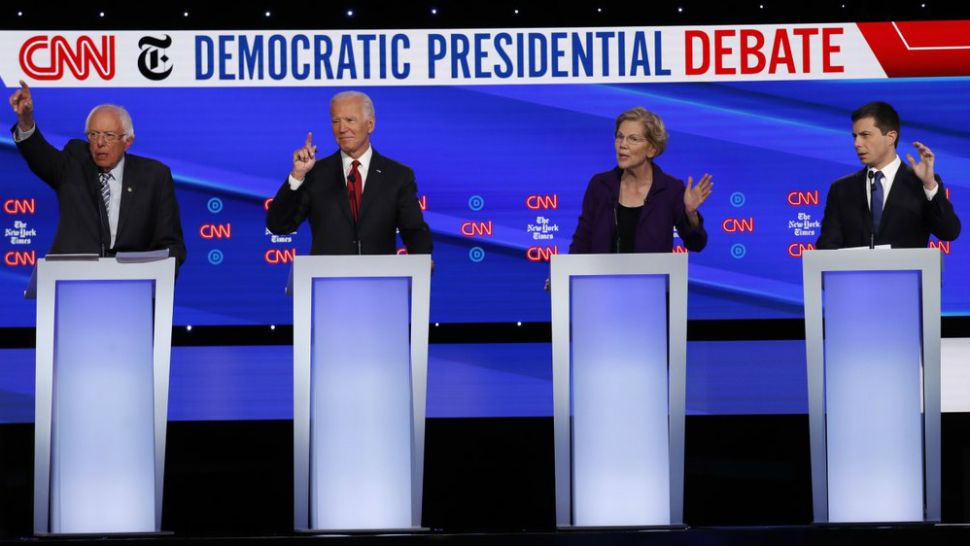WESTERVILLE, Ohio — Elizabeth Warren's rivals repeatedly jabbed at her during Tuesday night's Democratic presidential debate, accusing the Massachusetts senator of ducking questions about the costs of Medicare for All universal health insurance and her signature "wealth tax" plan.
- Warren pressed on raising taxes for middle class
- Sanders back on stage after recent heart ailment
- Debate touched on foreign policy, took place amid Trump impeachment inquiry
- RELATED: Fact Checking The Democratic Debates
Taking hits from all sides reflected Warren's rise to a front-runner in the crowded field of candidates who are looking to deny President Donald Trump a second term. Joe Biden, who has led the Democratic field for months, had to address Trump's unsupported accusations of wrongdoing by him and his son in Ukraine, but by and large avoided confrontation with his rivals.
Mostly out of the fray was Vermont Sen. Bernie Sanders, who spent the past two weeks recuperating at his Vermont home after a heart attack. He made no stumbles but failed to show the same fire as in previous debates. He got applause when he thanked supporters and rivals for their good wishes and declared, "I'm feeling great."
Warren, as in other debates, was pressed about whether she would raise taxes on the middle class to pay for her health care plan — and, as previously, she would not say yes or no but argued instead that lower premiums would mean that overall costs would go down for most Americans.
"So, I have made clear what my principles are here," she said.
More moderate Democrats, like Mayor Pete Buttigieg of South Bend, Indiana, and Minnesota Sen. Amy Klobuchar, pounced, calling for an approach that stops short of fully government funded health care.
"I appreciate Elizabeth’s work but, again, the difference between a plan and a pipe dream is something you can actually get done," Klobuchar said.
Added Buttigieg: "We heard it tonight. A 'yes' or 'no' question that didn’t get a 'yes' or 'no' answer."
The debate touched on foreign policy, too, a subject that has dominated the news in recent weeks as Trump said he was withdrawing most U.S. forces from Syria and then Turkey invaded the northern part of the country to attack Kurdish fighters. The Democratic presidential candidates denounced the president for abandoning Kurdish forces there, who are U.S. allies.
Hawaii Rep. Tulsi Gabbard, who served in Iraq with the Army, questioned the need for U.S. involvement in “regime change” conflicts in the Middle East. That prompted Buttigieg to respond: “What we are doing or what we were doing in Syria was keeping our word.”
“I would have a hard time today looking an Afghan civilian or soldier in the eye after what just happened over there,” said Buttigieg, who served in Afghanistan. “It is undermining the honor of our soldiers. You take away the honor of our soldiers, you might as well go after their body armor next.”
Biden had spent months facing sharp criticism from the rest of the field during debates, but he saw few candidates engage with him on Tuesday. Still, he struggled to fully explain why his newly promised ethics plan to prevent conflicts of interest involving his relatives wasn’t applied to his son Hunter when he was hired in 2014 as a director for a Ukrainian energy company.
That relationship has become a focal point of Trump’s effort to press for a Ukrainian government probe of the Bidens — an effort that was a major factor leading to the House impeachment inquiry into Trump.
On Sunday, Biden had vowed that “no one in my family will have an office in the White House, will sit in on meetings as if they’re a cabinet member, will in fact have any business relationship with anyone that relates to a foreign corporation or a foreign country.”
But CNN anchor Anderson Cooper asked, “If it’s not OK for a president’s family to be involved in foreign businesses, why was it OK for your son when you were vice president?”
Biden faltered some before offering, “My son did nothing wrong, I did nothing wrong.”
Still, most of the back-and-forth focused on Warren. Taking aim at her proposal to tax the wealthiest Americans, Klobuchar said, “I want to give a reality check here” and former Texas Rep. Beto O’Rourke suggested it was “punitive.”
The senator said that notion shocked her: “I don’t have a beef with billionaires.”
“Look, I understand that this is hard, but I think as Democrats we are going to succeed when we dream big and fight hard, not when we dream small and quit before we get started,” she said.
The debate stage of a dozen candidates made it difficult for any single candidate to stand out. And attacking Biden during previous debates did not result in major gains in the polls for other candidates — meaning criticizing Warren may not mean much this time around.
Hosted by CNN and The New York Times, the field’s fourth round of debates was the largest-ever. It took place on the campus of Otterbein University, just outside Columbus in Ohio, one of the nation’s toughest electoral battlegrounds, but also a state that has long helped decide presidential elections but has drifted away from Democrats in recent years.
The event also came as the impeachment inquiry against Trump has grabbed most of the nation’s political attention and left the Democratic race for the White House somewhat overshadowed.
Also debating were New York entrepreneur Andrew Yang, New Jersey Sen. Cory Booker and former Obama housing chief Julián Castro. Making his debate debut was billionaire activist Tom Steyer.



